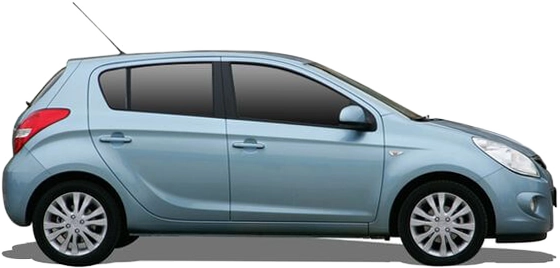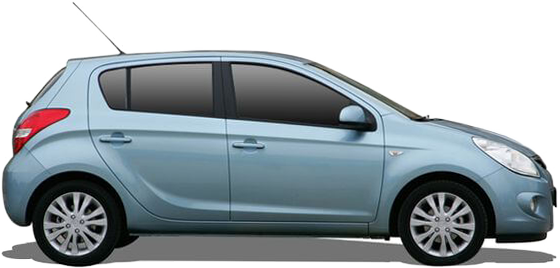The Comparative Analysis :
Ford Ka+ 1.2 Ti-VCT (16 - 18) vs. Hyundai i20 1.4 (09 - 12)
€ 11,800

€ 14,300

€ 11,800
Base Price ⓘBase price of a new vehicle with standard equipment in Germany at market launch.
€ 14,300
ⓘBase price of a new vehicle with standard equipment in Germany at market launch. Price Info
Vehicle Dimensions
The dimensions of these vehicles differ a little. The Ford Ka+ 1.2 Ti-VCT is 1.1 cm shorter, 1.5 cm narrower and 3.1 cm taller than the Hyundai i20 1.4.
Ford Ka+ 1.2 Ti-VCT
Hyundai i20 1.4
1521
1695
1910
1490
1710
1985
1695 mm
Width
1710 mm
1910 mm
Width Incl. Mirrors
1985 mm
1521 mm
Height
1490 mm
2489
3929
2525
3940
3929 mm
Length
3940 mm
2489 mm
Wheelbase
2525 mm
Vehicle Weight
Ford Ka+ 1.2 Ti-VCT
Hyundai i20 1.4
1055 kg
Kerb Weight
1100 kg
1510 kg
Gross Vehicle
Weight
Weight
1565 kg

Weight Difference:
45 kg
4.09 %

General
Ford Ka+ 1.2 Ti-VCT
Hyundai i20 1.4
KAF
Generation
PB
Hatchback
Car Body Style
Hatchback
Unleaded (95 RON)
Fuel Type
Unleaded (95 RON)

Front-wheel drive
Drive
Front-wheel drive

5-speed manual transmission
Transmission
5-speed manual transmission
Engine
Ford Ka+ 1.2 Ti-VCT
Hyundai i20 1.4
Straight-four petrol engine (naturally aspirated engine)
Engine Type
Straight-four petrol engine (naturally aspirated engine)
2
Valves
4
4
Cylinders
4
1198 CC
Engine Capacity
1396 CC
84 bhp
at 6300 rpm
Power
100 bhp
at 5500 rpm
Ford Ka+ 1.2 Ti-VCT
84 bhp
100 bhp
Hyundai i20 1.4
112 NM
at 4000 rpm
Max. Torque
137 NM
at 4200 rpm
Ford Ka+ 1.2 Ti-VCT
112 NM
137 NM
Hyundai i20 1.4
Performance
Ford Ka+ 1.2 Ti-VCT
Hyundai i20 1.4
105 mph
Maximum Speed
112 mph
13.3 sec
Acceleration 0 to 62 mph
11.6 sec
62 mph
62
mph
mph
185 m
0.000 sec

Ford Ka+ 1.2 Ti-VCT
62 mph
62
mph
mph
161 m
0.000 sec

Hyundai i20 1.4
▶ REPLAY
12.56 kg/bhp
Weight-to-Power Ratio
11 kg/bhp
Ford Ka+ 1.2 Ti-VCT
12.56 kg/bhp
11 kg/bhp
Hyundai i20 1.4
Fuel Economy / Emissions
Ford Ka+ 1.2 Ti-VCT
Hyundai i20 1.4
Fuel Economy
56 mpg
combined
47 mpg
Ford Ka+ 1.2 Ti-VCT
56 mpg
47 mpg
Hyundai i20 1.4
43 mpg
city
37 mpg
71 mpg
motorway
56 mpg
42 L
Fuel Tank Capacity
45 L
522 mi
Range
466 mi
Ford Ka+ 1.2 Ti-VCT
522 mi
466 mi
Hyundai i20 1.4
Environmental Impact
94.8 kWh
Total Energy Consumption
per 100 miles ⓘThe total energy consumption per 100 miles is the amount of energy consumed by a vehicle when burning fuel or using electricity per 100 miles (final energy), and the energy required to produce the appropriate amount of fuel or electricity (primary energy).
per 100 miles ⓘThe total energy consumption per 100 miles is the amount of energy consumed by a vehicle when burning fuel or using electricity per 100 miles (final energy), and the energy required to produce the appropriate amount of fuel or electricity (primary energy).
113.6 kWh
Ford Ka+ 1.2 Ti-VCT
94.8 kWh
113.6 kWh
Hyundai i20 1.4
Euro 6b (NEFZ)
Emission Standard
Euro 4 / Euro 5
114 g/km (NEFZ)
CO2 Emissions
142 g/km (NEFZ)
Practical Convenience
Ford Ka+ 1.2 Ti-VCT
Hyundai i20 1.4
5
Doors
3
5
No. of Seats
5
455 kg
Maximum Payload
465 kg
270 L
Boot Capacity
295 L






849 L
Boot Capacity (Seats Down)
1060 L



















